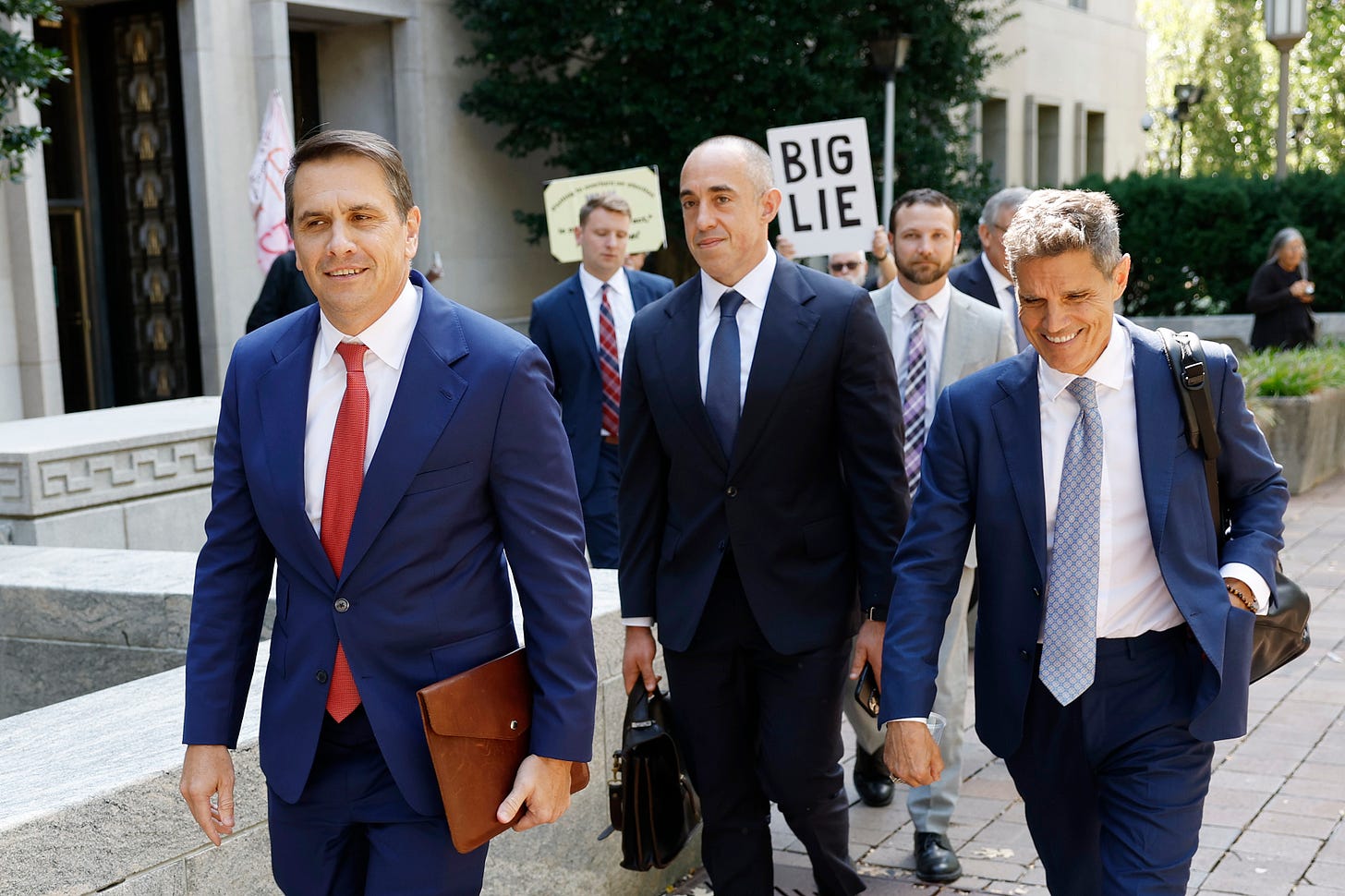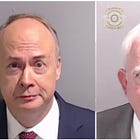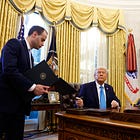Elite lawyers sell out the rule of law
Sullivan & Cromwell enlist in Trump's assault on the justice system.

🏛️ 📜 ⚖️ With corporate outlets obeying in advance, supporting independent political media is more important right now than ever. Public Notice is possible thanks to paid subscribers. If you aren’t one already, please click the button below and become one to support our work. ⚖️ 📜 🏛️
As Trump moves forward with his assault on the rule of law and our nation’s democracy, lawyers must decide if they will stand up for the justice system — or participate in its destruction.
One of the nation’s most prominent corporate law firms, Sullivan & Cromwell, has made its decision, and it is the wrong one. S&C recently announced its ambition to become the leading Wall Street “MAGA” law firm by taking on the representation of Trump in the appeal of his “hush money” felony conviction. S&C has made it clear they will be “defending" Trump by joining in his campaign to undermine the legitimacy of New York’s criminal justice system — and with it the prosecutors, the judge, and even the jurors who had the temerity to hold him to account for his crimes.
It’s a sad spectacle to see a law firm that clients have long turned to for counsel on how to comply with the law rendering itself into an instrument for lawlessness. It’s also a cautionary example of how lawyers should not conduct themselves as the Trump regime proceeds with its effort to replace the nation’s justice system with one governed by cronyism and corruption.
Danielle Sassoon shows the way
Prosecutor Danielle Sassoon, a member of the Federalist Society who Trump selected to serve as acting US Attorney in Manhattan, just faced a stark test of how a responsible government lawyer should conduct themselves during Trump’s lawless Regime, and passed.
Emil Bove, a former Trump defense lawyer who’s now an acting deputy attorney general, demanded that Sassoon file a motion to dismiss the public corruption indictment of New York Mayor Eric Adams as part of a scheme designed to turn Adams into a Trump lackey. But Sassoon recognized that the quid pro quo exchange was improper, all the more so given that the underlying charges against Adams involved his allegedly corrupt relationship with the despotic Turkish regime of Recep Tayyip Erdoğan. So Sassoon and a number of other DOJ prosecutors opted to resign.
In a letter to Attorney General Pam Bondi explaining her decision, Sassoon cited a 1940 speech by then Attorney General Robert Jackson, who went on to become both a Supreme Court justice as well as the lead US prosecutor at the Nuremberg trials of Nazi leaders.
“The prosecutor at his best is one of the most beneficent forces in our society,” said Jackson, but “when he acts from malice or other base motives, he is one of the worst.”
Under the standard Jackson set, Sassoon and her colleagues were right to resign, just as were Attorney General Elliot Richardson and his deputy William Ruckelshaus when they quit in protest rather than carrying out Richard Nixon’s order to fire Watergate special prosecutor Archibald Cox.
Such rightful actions are far more than symbolic. Although Nixon got a toady to carry out the firing (future Reagan Supreme Court nominee Robert Bork), the resignations ended up hastening his exist from the White House by drawing attention to his abuses of power. And the resignations of Sassoon and her colleagues seem poised to have a salutary influence within the DOJ — yet another prominent prosecutor resigned this week rather than carry out what she believed to be an improper directive.
“An important part of the legal machinery”
Given the scope of the Trump’s assault on the justice system, however, we cannot rely solely on government lawyers to stand up for the rule of law. Private citizens, and particularly lawyers, will also bear a weighty responsibility during the coming months and years.
Much of the public, and frankly many attorneys, think of lawyers simply as hired guns whose job it is to achieve the desired goals of their clients regardless of the consequences. For example, a prominent “legal commentator” recently described the lawyer who negotiated the alleged quid pro quo deal for Adams as a “good lawyer.” Donald Trump had the same view of his favorite lawyer, the proudly amoral fixer Roy Cohn.
Clients have every right and expectation that their lawyers will zealously represent them — we have a duty to do that, and the best lawyers are (unsurprisingly) very competitive folks with a strong desire to win. But we are obligated to do so while following and upholding the rule of law.
A note from Aaron: Working with brilliant contributors like David takes resources. If you aren’t already a paid subscriber, please sign up to support our work.
The tension between achieving a desired result and upholding ethical principles is not new. But it has only grown as the complexity of laws and regulations, and with it the influence of lawyers, have expanded over the decades.
Among the most influential lawyers to address this tension was another future Supreme Court Justice, Louis Brandeis, who, before joining the Court, represented businesses — including financial institutions — while also advancing progressive public policies.
Brandeis described lawyers as “an important part of the legal machinery,” but by that he hardly meant that attorneys are mere operatives without normative responsibilities. To the contrary, Brandeis argued that because lawyers are central to our legal system, they bear a responsibility to ensure that it operates justly. That’s particularly true for those who are privileged enough to reach the elite (and most highly compensated) tiers of their profession. He decried a phenomenon that, even in the early 1900s, was growing among business lawyers:
Instead of holding a position of independence, between the wealthy and the people, prepared to curb the excesses of either, able lawyers have, to a large extent, allowed themselves to become adjuncts of great corporations and have neglected the obligation to use their powers for the protection of the people. We hear much of the "corporation lawyer," and far too little of the "people's lawyer."
While Brandeis was extraordinary in many ways, his view of attorneys as moral and ethical actors has, despite stereotypes to the contrary, actually proven to be influential. During the 20th century, as the practice of law increasingly professionalized, it adopted ethics rules that place substantial guardrails around legal advocacy. At the same time, as the American economy and government became ever more complex, lawyers came to play a central role in counseling clients on how to comply with the law — a role that is, if anything, more important in promoting the rule of law than the activities of law enforcement agencies.
Furthermore, many of the most prominent lawyers at firms like Sullivan & Cromwell have spent portions of their careers as government officials, experience that clients value because it gives those attorneys insights into how agencies’ legal and regulatory schemes operate. As a result, lawyers have come to have an economic and normative stake in preserving the rule of law.
Trump’s assault on the system
During the Trump era, the importance of lawyers hewing to the ethical principles that govern our profession has only become more clear, even as the temptations to not do so have grown for some.
Trump is the first president to spend most of his political career under actual or potential criminal investigation, let alone to be a convicted felon. And he has long wanted to have lawyers from major law firms represent him in his criminal matters, as they sometimes have in commercial disputes, to add legitimacy and force to his assault on the justice system.
During the Mueller investigation, Trump reportedly approached Robert Giuffra Jr., a prominent business litigator who is co-chair of Sullivan & Cromwell, presumably because he wanted the stamp of “establishment” heft S&C could offer him. But Giuffra, at the time, said no.
S&C is among the oldest and most prominent of Wall Street firms. The firm’s website boasts that, since the 19th century, “Sullivan & Cromwell has been involved in some of America’s greatest industrial, commercial and financial enterprises,” from Edison General Electric Company to Goldman Sachs. Its history has also been inextricably connected to the government, with partners including CIA Director Allen Dulles and presidential advisor Arthur Dean. Many of S&C’s current partners have held similarly prominent roles in government, including as DOJ prosecutors.
S&C, however, rejected Trump as a client the first time he asked, as did nearly every prominent law firm he approached about representing him in criminal matters during his first term. And for good reason.
From the outset, Trump’s defense “strategy” has been to attack and delegitimize the rule of law and those who enforce it, from FBI agents and prosecutors to judges. Presumably, the many former prosecutors at S&C were not comfortable with the idea of their firm joining the president in undermining a system which they had devoted their professional lives to upholding.
Most prominent law firms like S&C likewise largely kept their distance from Trump’s attacks on the outcome of the 2020 election, as lending their reputations to an effort to undermine the nation’s democracy would be perilous.
Election law attorney Cleta Mitchell was forced out of the prominent Foley & Lardner firm when it came to light that she had joined Trump on the phone call during which he pressured Georgia Secretary of State Brad Raffensperger to “find” votes for him. After a number of the lawyers who joined in Trump’s scheme faced ethics charges and in some cases indictments, the leaders of firms like Foley & Larder likely breathed sighs of relief at their good judgment.
The forbidden fruit
When Trump faced multiple criminal investigations following his loss in 2020, large law firms like Giuffra’s initially continued to keep their distance.
For example, former federal prosecutor Todd Blanche had to resign from his partnership at the venerable Cadwalader firm to form one where he and Bove were lavishly compensated solely to represent Trump in several of the various criminal cases and investigations of his conduct, including the hush money case that ultimately led to his conviction in New York.
Blanche and Bove turned out to be part of a trend. As Trump’s star began to rise again within the GOP, and as the opportunities both to represent him and his cronies in a plethora of criminal and other legal matters grew in numbers and lucrative potential paydays, an entire sub-market of “MAGA law” practitioners began to establish itself.
Inevitably, in the wake of Trump’s return to the White House, the question of whether some large law firms would rethink their reticence to take him on as a client, and thereby join the MAGA law bandwagon, arose again. And that is where S&C has reentered the picture. The firm appears to have decided set itself up as an institution that is not only prepared to exploit prominent connections to the Trump regime, but also to actively participate in his assault on the rule of law.
Trump nominated an S&C partner and former SEC chairperson, Jay Clayton, to take Sassoon’s place and serve as the permanent US attorney for the southern district of New York. Then came news that that Sullivan & Cromwell’s Giuffra decided to represent Trump after all, this time in the appeal of his New York conviction for preparing false business records to conceal hush money payments to Stormy Daniels.
Although Giuffra is not a leading criminal defense lawyer, it’s not hard to understand why Trump wants them to sign his brief — it will add a heavy dose of “establishment” legitimacy to his appeal. But that, of course, is also why it’s reprehensible that S&C has taken on the case.
Trump and his cronies are currently embarked on a campaign to destroy the nation’s justice system. He’s plainly determined to weaponize the DOJ and the other federal law enforcement agencies into a tool to harass (or worse) his enemies and protect his cronies. This is exemplified by the Adams debacle and the “task force” AG Pam Bondi has established to go after those who investigated and prosecuted Trump and other insurrectionists.
As for those law enforcement institutions that he cannot control, and particularly the New York justice system in which he was convicted, Trump is determined to fatally undermine their legitimacy.
Before, during, and after his criminal trial, Trump and his lawyers promoted defamatory attacks on everyone from the judge presiding over the case and his daughter to the prosecutors, and even some jurors. These reprehensible and baseless smears — which were only partially mitigated by judicial gag orders — were classic examples of the kind of bad faith conduct that Brandeis argued lawyers have an obligation to avoid. Yet the defense team of Bove and Blanche has no regard for such constraints.
On joining Trump’s team following Bove and Blanche’s move to the upper reaches of the Trumped-up DOJ, Giuffra immediately demonstrated that he and S&C are prepared to “defend” Trump by mendaciously attacking the New York justice system and the public servants who enforce it. Giuffra heralded Sullivan and Cromwell’s engagement by Trump with this statement: “The misuse of the criminal law by the Manhattan D.A. to target President Trump sets a dangerous precedent.” In a typically inversionary bit of Trumpish rhetoric, Giuffra asserted that Trump and his new lawyers were standing up for the “rule of law.”
We sometimes hear rhetoric like that from criminal defense lawyers representing self-declared “underdogs,” whether they be mob figures or civil rights activists. But when such words come from a senior partner of one of the nation’s largest law firms who is representing a president of the United States, the meaning is fundamentally different.
Giuffra and some his partners doubtlessly have concluded that becoming part of the “machine” of Trump’s authoritarian counterrevolution will make S&C more attractive to some financial institutions and other potential clients. It is, however, hard to imagine a greater betrayal of the principles Brandeis advanced.
It’s all but certain that many S&C lawyers are unhappy with the firm’s decision to become part of the Trump regime anti-rule of law machine, and for good reason. Apart from the sheer immorality of the firm’s choice to become an instrument of a scheme to break America’s legal and justice systems, an obvious, and starkly pragmatic, question is also presented: Once our justice system is destroyed and replaced with one in which power and cronyism make adherence to laws optional, who will want to spend large amounts of money on highly credentialed and knowledgeable lawyers trained to counsel clients in how to comply with them?
Ultimately, by joining in Trump’s effort to make America lawless, Sullivan & Cromwell may be working to render itself irrelevant.
That’s it for today
We’ll be back with more tomorrow. If you appreciate today’s newsletter, please support our work by signing up. Paid subscribers make PN possible.
Thanks for reading.









The issue you raised about the role of lawyers in our system of government is even more profound, fundamental and important than many lawyers or clients realize (or care to acknowledge).
Every lawyer is an actual officer of every court to which the lawyer is admitted to practice. That status (as a court officer) was addressed directly in our Constitution. The Founders (in Article VI of our Constitution) required that "all executive and judicial Officers" (and all legislators) "both of the United States and of the several States, shall be bound by Oath or Affirmation, to support this Constitution."
Congress was more specific in a federal statute (5 U.S.C. 3331) regarding attorneys (and judges) employed by the federal government. Every such attorney or judge must "bear true faith and allegiance to" our Constitution, including by "support[ing] and defend[ing] the Constitution of the United States against all enemies, foreign and domestic."
Article VI also establishes that every public servant in every branch of every government (and every attorney while practicing before any court) must conform their own conduct to "the supreme Law of the Land," which comprises our "Constitution" and federal "Laws" that were "made in Pursuance" of our Constitution "and all Treaties." The Supremacy Clause bars all lawyers and judges from following any unconstitutional order from any putative superior officer or client.
All of the lawyers participating in this behavior need to have BAR complaints filed against them with the prime witnesses being the DOJ prosecutors and FBI agents being the ones filing the complaints for acting unlawfully and egregious ethics violations. Judges also need to be the tip of the spear to have their law licenses revoked. That's how you fight back.